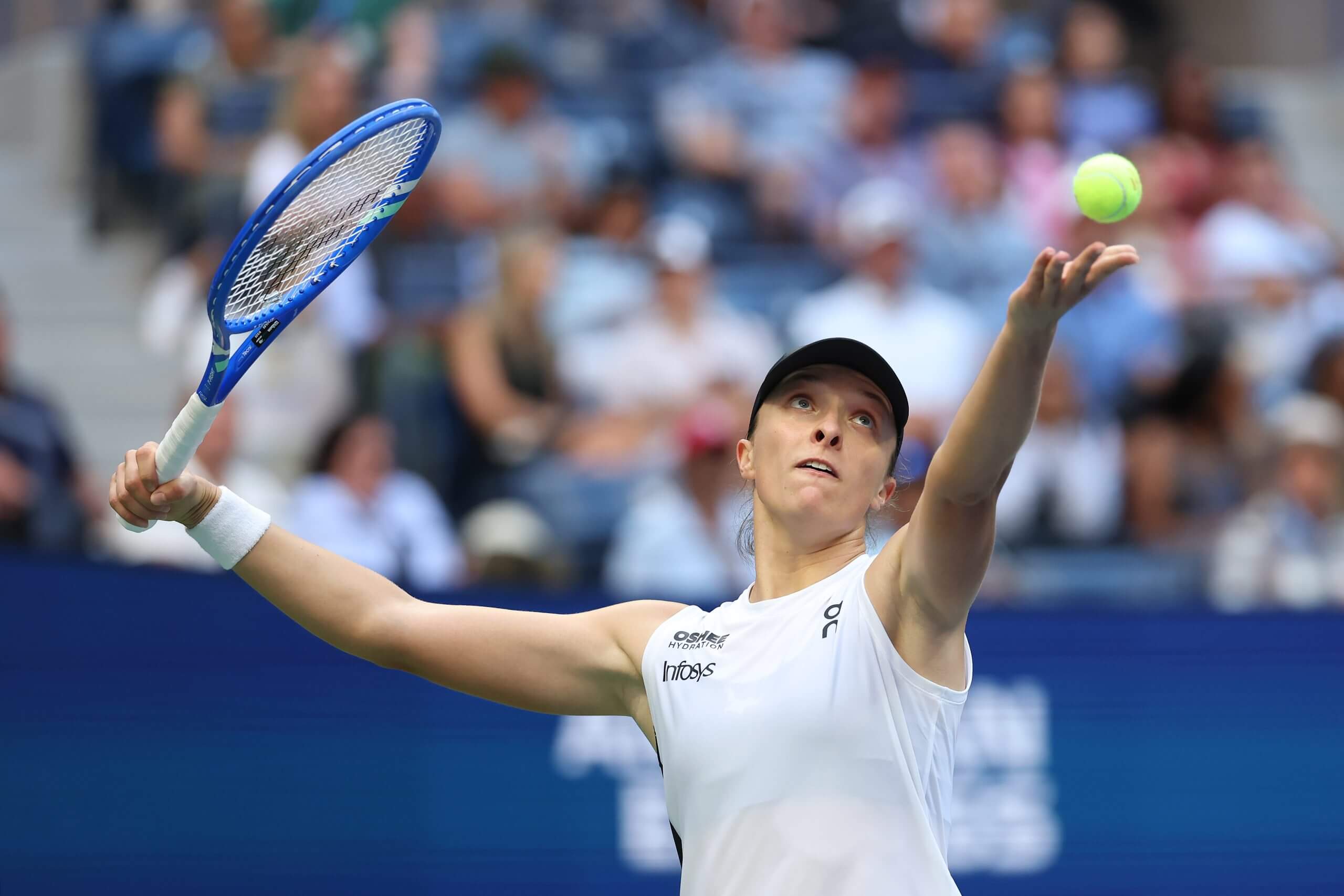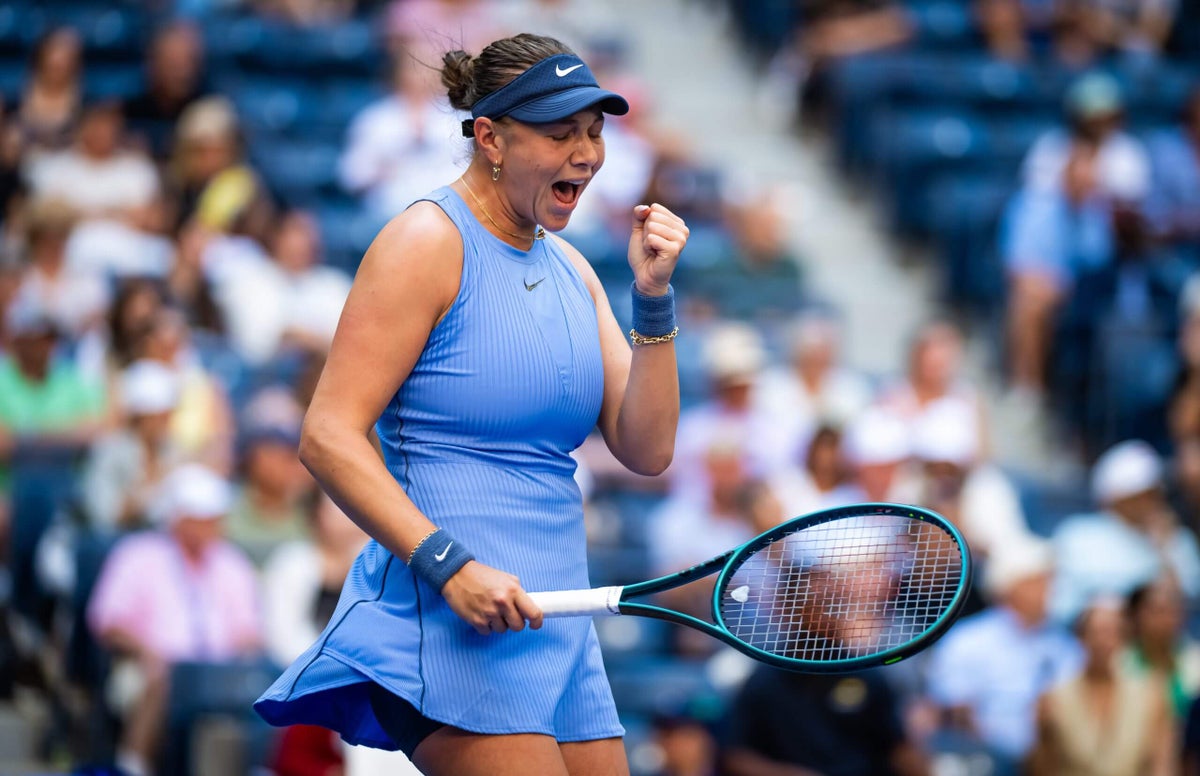FLUSHING MEADOWS, N.Y. — Fifty-three days later, Amanda Anisimova found redemption on Arthur Ashe Stadium.
After suffering the first 6-0, 6-0 Wimbledon final defeat since 1911 in July, Anisimova beat her tormentor on the grass, Iga Świątek, to reach the U.S. Open semifinals. In a monumental turnaround from the ultimate tennis humiliation on the biggest stage of all, Anisimova rebounded with a 6-4, 6-3 victory Wednesday.
From the moment Anisimova lost the Wimbledon final, she has been publicly vulnerable in processing it. Her emotional on-court speech immediately afterward, in which she wept as she paid tribute to the sacrifices her mother made for her career, won plenty of new fans. After leaving London, she went to New York, spent some time with her nephews, then hit the beach before getting back to work.
Her results coming into the U.S. Open were mediocre, but she has been locked in here. Anisimova has dropped one set en route to the semifinals, and against Świątek, she looked determined to quickly put the Wimbledon final behind her.
But the journey to the moment of jubilation at her victory on Wednesday began pretty much as soon as the Wimbledon final was over. First there was the cathartic on-court interview, and then a phone call with a friend shortly after the match had finished.
“I kind of just laughed it off,” Anisimova said of the call in a news conference. “I was, like, ‘Yeah, this is insane.’
“I don’t know. I feel like I was really able to bounce back from it really quickly.”
Anisimova felt like she was over the final a few weeks ago, and had largely stopped thinking about it. But the night before facing Świątek again, she confronted the nightmare head on. “Nobody told me to, but I watched them back, as painful as it was, just to see, what I can avoid or what went wrong,” she said.
“Then after, I had to watch some good highlights to remove that from my brain.
“I think it was important for me to kind of see what happened last night going into today’s match, but back then it was just kind of, like, move on. It’s just kind of a freak thing that happened.”
Her main takeaway from watching the final back? “That I was slow as hell,” Anisimova said, laughing.
Come Wednesday, as she went through her match preparations in the gym, the TV screens on both sides of her were showing a rerun of the Wimbledon final. A scene that sounded like tennis meets “A Clockwork Orange.”
When the match was finally underway, after a long wait because of a lengthy men’s match before it, Anisimova was broken in the opening game having had a game point. Memories of Centre Court immediately bubbled up for everyone watching. This time, she broke straight back, to win her first game against Świątek, the No. 2 seed and one of the title favorites, at the 14th attempt. The roar that met Anisimova punching away a forehand to get the break was as if she’d won the match. Relief swelled through the stadium, and Anisimova could concentrate on simply winning a tennis match.
“I feel like with each match that I’ve played, I tell myself to not go into the match with fear,” she said.
“I think when I started the tournament, I was kind of going into the matches with a little bit of fear and maybe holding back a bit. As I’ve been progressing and playing more and more, I told myself, ‘you can’t go into the match with any fear,’ especially if I’m playing against top players.
“It’s just not a negotiable for me, because if I want to win the match, I’m going to have to play really brave and strong tennis.”
Anisimova generally served well in the opening set, but Świątek was left rueing two missed break points at 2-2, when she completely miscued a forehand off a loopy defensive shot from Anisimova that hung in the New York afternoon, and then netted a regulation forehand. From there, Anisimova started to get on top.
She was just about hanging in during the forehand-to-forehand exchanges, and was then able to unleash with her world-class backhand. Świątek saved a break point down 4-3 with some spectacular depth on the forehand side, but Anisimova broke two games later to take the set. She hit 13 winners compared to just six unforced errors in what was an extremely clean set. Anisimova was having particular joy going after the Świątek second serve, winning 12/17 of such points, and her attacking shots were skimming the lines and the net tape. Most impressive was her defense, which stopped Świątek from moving her laterally and exposing her strokes on the run.
“I couldn’t win today’s match playing like that, serving like that, and with Amanda being so aggressive on the returns,” Świątek said in a news conference afterwards. “So I kind of get it.”

Iga Świątek’s serve did not offer enough protection against Amanda Anisimova’s offensive. (Elsa / Getty Images)
Świątek broke immediately at the start of the second set, but having only made 53 percent of her serves in the first set, knew she’d come under pressure in her own service games. Anisimova duly broke back for 2-2, and was striding around the court with purpose, looking like she believed this was going to be her day. The crowd were getting increasingly into it, swept up by the comeback story of a player last seen by the wider world in tears on Centre Court.
Anisimova sensed that she needed to ride the wave of momentum. An aggressive forehand return earned her a break point, and when Świątek double-faulted, she had the chance to serve out the match. If Anisimova was feeling nervous, on the verge of beating a six-time Grand Slam champion, she didn’t show it. A fearless second serve took her up 30-0, and then she got to 40-0, with three match points.
Maybe she then finally remembered where she was, double-faulting on her second match point after sending a backhand long on the first. But then it was all over, an extremely fortunate dead net cord taking the ball trickling over the net, just as it had done to take her to 4-3 in the second set.
Ashe rose as one, partly in delight, partly in disbelief, for its new tennis folk hero.
Anisimova, who took an eight-month break from tennis a couple of years ago, to manage her wellbeing, said she was able to complete this remarkable turnaround by maintaining a sense of perspective.
“At the end of the day, to me it was just tennis,” she said. “I mean, I’m living out my dreams, and I’m in a really good place in my life. I’m happy every single day, which I really wasn’t a couple of years ago.
“I was going through a lot, and every single day was kind of a s—y day for me. Looking back at that, it’s not the most important thing to me. It’s what happened that day, and really it’s just a tennis match at the end of the day.”
Anisimova’s heartbreak at Wimbledon had touched so many people because of how relatable it was. Some will always remember her chiefly for that, but she is determined to not let it define her tennis career.
And seven-and-a-half weeks later, she has offered the best possible riposte, with a U.S. Open semifinal against Naomi Osaka awaiting her and her faithful Thursday night.
“Today is definitely the most meaningful victory I’ve had in my life,” Anisimova said.
(Photo: Robert Prange / Getty Images)

